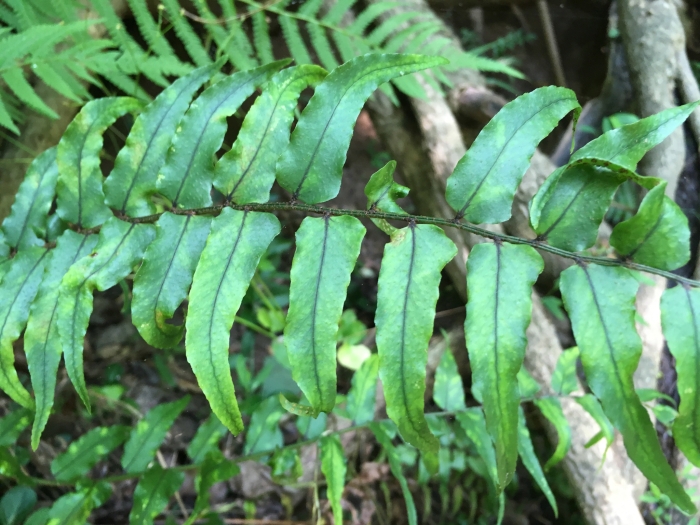Japanese Holly Fern
(Cyrtomium fortunei)
Japanese Holly Fern (Cyrtomium fortunei)
/
/

Shawn Taylor
CC BY 4.0
Image By:
Shawn Taylor
Recorded By:
Copyright:
CC BY 4.0
Copyright Notice:
Photo by: Shawn Taylor | License Type: CC BY 4.0 | License URL: http://creativecommons.org/licenses/by/4.0/ | Rights Holder: Shawn Taylor | Publisher: iNaturalist | Date Created: 2018-06-03T12:11:26-07:00 |












































Estimated Native Range
Summary
Cyrtomium fortunei, commonly known as Japanese Holly Fern, is an evergreen fern native to the understory of temperate forests, often found in shaded and moist areas in East Asia, including China, Japan, and Korea, as well as in the Himalayas. It typically grows to a height and width of 1-2 feet (0.3-0.6 meters), forming dense clumps of arching fronds. The fronds are glossy and leathery, resembling holly leaves, which is how it gets its common name. The sori, or spore-producing structures, are located on the underside of the fronds and are covered by indusia, giving the fern a neat appearance.
Japanese Holly Fern is appreciated for its lush, evergreen foliage that adds a touch of elegance to shaded garden areas. It is an excellent choice for ground cover in woodland gardens, shaded borders, and container plantings. This fern is relatively low-maintenance, requiring consistently moist soil and protection from strong winds. It thrives in humus-rich, well-drained soil and benefits from an annual application of leaf mold or compost. While it is generally pest-free, it can occasionally suffer from scale insects or fungal diseases in poor conditions. The Japanese Holly Fern has been recognized with the Royal Horticultural Society’s Award of Garden Merit, indicating its value in ornamental horticulture.CC BY-SA 4.0
Japanese Holly Fern is appreciated for its lush, evergreen foliage that adds a touch of elegance to shaded garden areas. It is an excellent choice for ground cover in woodland gardens, shaded borders, and container plantings. This fern is relatively low-maintenance, requiring consistently moist soil and protection from strong winds. It thrives in humus-rich, well-drained soil and benefits from an annual application of leaf mold or compost. While it is generally pest-free, it can occasionally suffer from scale insects or fungal diseases in poor conditions. The Japanese Holly Fern has been recognized with the Royal Horticultural Society’s Award of Garden Merit, indicating its value in ornamental horticulture.CC BY-SA 4.0
Plant Description
- Plant Type: Fern
- Height: 1-2 feet
- Width: 1-1.5 feet
- Growth Rate: Moderate
- Flower Color: N/A
- Flowering Season: Non-Flowering
- Leaf Retention: Evergreen
Growth Requirements
- Sun: Part Shade, Full Shade
- Water: Medium
- Drainage: Medium, Slow
Common Uses
Bank Stabilization, Border Plant, Deer Resistant, Groundcover, Rabbit Resistant, Rock Garden, Salt Tolerant
Natural Habitat
Temperate forest understories and shaded, moist areas in East Asia and the Himalayas
Other Names
Common Names: Fortune’s Holly-Fern , Asian Netvein Hollyfern , Asian Holly Fern , Fortune's Net Vein Holly Fern , Smalle Ijzervaren , 쇠고비
Scientific Names: Cyrtomium fortunei , Cyrtomium fortunei var. fortunei , Polystichum fortunei , Cyrtomium fortunei f. polypterum , Cyrtomium fortunei f. latipinna , Phanerophlebia fortunei , Polystichum falcatum var. fortunei , Cyrtomium recurvum , Cyrtomium shandongense , Aspidium falcatum var. fortunei
GBIF Accepted Name: Cyrtomium fortunei J.Sm.